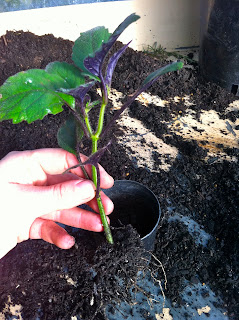 |
| The Plectranthus cuttings have developed nice new roots. |
Second job is: 100 Lavender cuttings. Steve demonstrated earlier a good type of semi hardwood tip cutting from the Lavandula angustifolia (English Lavender) hedge running through the centre of the pottager garden. So I grab my secateurs and start collecting. My first lot are mostly good ones but some prove too small so the second time I visit the hedge I get pickier about selecting the right tips. As Steve shows me, to prepare the cutting, I cut the tip off the hardwood just beneath the first lot of growth. I tear off the lower foliage and snip the top off if the growth is too big. This will reduce the cutting's need for nutrients while it has a chance to establish roots. I prepare my 3 pots by washing them out carefully and Steve says i could use rooting powder but probably not necessary with Lavender as it takes so well.
So 100 times later....... I have a nice looking bunch of cuttings to sit upon the heat bed. The are all labeled correctly with the date, common and botanical names and my name so they can tell who got it wrong if they all fail (hopefully not!).
Next I take a break from the pottager to go down to the compost pile and see how the mulcher/chipper works. Steve has a good quality steel body, Australian made one that we have been interested in for our property so I'm keen to see what Steve thinks of it and how it is to operate. There is a nice huge pile of cuttings down by the compost heap so we make a start. Steve runs me through the start up procedure and PPE for this machine is obviously rather important. Safety glasses, earmuffs, safety boots and gloves are a must. Safety procedures include not sticking your arm far enough in the feeder mouth to get it mulched, but as Steve points out the design of the machine makes that pretty impossible so we should be safe for now!
The machine self feeds but probably not as much as I had imagined and the irregular shaped material does get stuck in the feeder and has to be forcibly rammed in and through with the next branch. Apparently the disposal chute can also get jammed up regularly especially when chipping up softer, fleshier material. However Steve feels it works well overall. It provides a cost saving of disposing the material on the tip, as well as the satisfaction of recycling back into the garden, making it a worth while, albeit time consuming effort.
Job three after lunch is to plant out some veggie seedlings. First of all I need to hoe up some new beds in the deep, recently rotavated soil. So I get to it, making sure they look as neat as Tara's and are straight! I'm quite happy with my first hoeing efforts and don't think Tara will be upset when she arrives back at work to see them! The fun part is next......the planting - new baby beetroot, broccoli, cauliflower, bok choy, kale and lettuce seem very happy bedded down in their new home. Steve asks me to make sure I plant them deep enough to support the fragile new stems from working loose in the wind. A good water in and a sprinkle of blood and bone to hopefully deter the rabbits and it's all finished.
After this Steve takes me on a trip to the South Hobart tip to empty the truck and have an eye spy at the huge green waste recycling centre up there. This is where the Gov House green waste, that is not composted on site, is taken to be disposed of. All this material is then composted in huge rows at the McRobies Rd site and turned into black gold that is then sold back to the public. This is composting on a HUGE scale and very impressive to see.
When we return at the end of the day, I make sure to tidy up behind me, tools away, hose curled up, potting bench and glasshouse floor swept and rubbish in the bin. Another good day's work complete.







Commercial composting, bad news into good news!
ReplyDelete